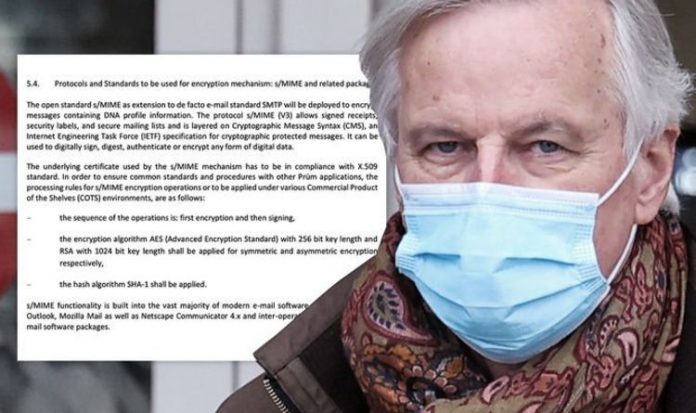After almost a year of negotiations and multiple missed deadlines, Britain and the EU secured a post-Brexit trade deal at the end of December. Announced on Christmas Eve, Prime Minister Boris Johnson described it as a “jumbo Canada-style” deal, as he declared: “All our red lines about returning sovereignty have been achieved. “Everything that the British public were promised during the 2016 referendum and in the general election last year is delivered by this deal.
“The deal is fantastic news for families and businesses in every part of the UK. We have signed the first free trade agreement based on zero tariffs and zero quotas that has ever been achieved with the EU.”
Speaking from Brussels, European Commission President Ursula von der Leyen said the EU had achieved “five-and-a-half years of predictability for our fishing communities”.
She added that on issues such as climate change the EU and the UK will stand “shoulder to shoulder to deliver on our common global goals”.
As usual, though, the devil is in the detail and the full text of the trade deal reveals an ugly truth.
Sections of the agreement appear to have been “copied and pasted” from old documents.
In particular, the text on page 921, under “Protocols and Standards to be used for encryption mechanism: s/MIME and related packages” seems to have been taken straight from the EU’s playbook on cross-border cooperation, written almost 13 years ago.
The wording comes from the EU Council decision of June 23, 2008, on “the stepping up of cross-border cooperation, particularly in combating terrorism and cross-border crime”.
Referencing encryption technology, it mentions Mozilla Mail and Netscape Communicator as “modern e-mail software package” – last updated in 2002.
It recommends SHA-1 as a hash algorithm, despite being deprecated by the National Institute of Standards and Technology in 2011 as insecure.
Express.co.uk contacted the European Commission, who defended its negotiators claiming that creating a new parallel system would have been time-consuming and a waste of public resources.
JUST IN: Sturgeon fury as Scots told to make concessions for independence
It also admitted using an “obsolete technical annex”.
A spokeswoman for the Commission said: “The EU-UK Trade and Cooperation Agreement provides for the automatic exchange of DNA data, fingerprint data and vehicle registration data between the UK and EU member states..
“The legal and technical framework governing this exchange is the same as the one that currently applies between EU member states, i.e. the Prüm framework, and to which the UK also partially took part before the end of the transition period.
“For the future cooperation between the EU and the UK, it was decided to allow the UK to continue to connect to this existing network instead of creating a new parallel system which would have been time-consuming and a waste of public resources.”
The spokeswoman noted the technology used in the Prüm framework has evolved since its creation and relies today on modern and secure IT and protocols.
However, she added: “We recognise that the technical annex is partly obsolete but in practice cooperation happens on the basis of updated technologies, which ensures that the exchange of data is secure.
DON’T MISS:
EU Army green light as Merkel’s would-be heir backs integration [INSIGHT]
Bundesbank’s ‘plan to print Deutsche Marks’ exposed [REVEALED]
Brexit talks continues as UK set to negotiate ‘New Zealand-style deal’ [EXCLUSIVE]
“We decided not to change the annex that currently also applies in EU law, as we are currently working on updating the EU framework, including its annex, in the light of operational, technological, forensic and data protection developments.
“When this is done, the EU UK Trade and Cooperation Agreement includes the possibility to notify the UK that the EU considers it necessary to amend the relevant rules in the EU-UK Agreement.”
Commenting on the old technology used in the deal, Professor of corporate law at the London School of Economics (LSE) Edmund Schuster wrote on Twitter: “Taking the UK into its bright future, using Netscape and SHA-1.
“This is unbelievable.
“Although perhaps we should be grateful that we haven’t agreed to DNA data exchange via telegraph.”







